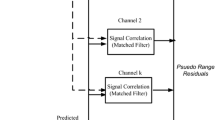Abstract
In vector tracking loop (VTL), the relativity among received signals is exploited to deeply integrate the entire information within signal processing channels. However, the tracking error in one channel may corrupt other channels and lead to an increasing degradation in the tracking performance. An adaptive GPS vector tracking loop with the detection and isolation of contaminated channels is proposed to suppress the propagation of tracking error and to make the vector-based receiver less vulnerable in poor signal quality environments resulting from signal attenuation, interference and jamming. The vectorial transfer function models and the noise bandwidths of both the vector frequency lock loop and the vector delay lock loop are established to accurately calculate bandwidths and optimally design parameters for VTL. The autonomous fault detection algorithm based on uniformly most powerful test for VTL is designed to detect and isolate contaminated channels (with large tracking error due to the poor signal quality) by monitoring the bandwidth statistics of all tracking loops. The results of trials in harsh situations show that the proposed adaptive VTL is superior to baseline VTL, allowing the accuracy, the availability and the reliability of the vector-based receiver to be improved. In conclusion, the proposed adaptive VTL with the detection and isolation of contaminated channels is a powerful method for applications in GPS-challenged environments.
















Similar content being viewed by others
References
Dardin SFS, Calmettes V, Priot B, Tourneret JY (2013) Design of an adaptive vector-tracking loop for reliable positioning in harsh environment. In: Proceedings of ION GNSS 2013, Institute of Navigation, Nashville, TN, 22–25 September, pp 3548–3559
Groves PD (2013a) Principles of GNSS, inertial, and multisensor integrated navigation systems. Artech House, Norwood
Groves PD (2013b) Principles of GNSS, inertial, and multisensor integrated navigation systems. Artech House, London
Henkel P, Giger K, Günther C (2009) Multifrequency, multisatellite vector phase-locked loop for robust carrier tracking. IEEE J Sel Top Signal Process 3(4):674–681
Kim KH, Jee GI, Im SH (2011) Adaptive vector-tracking loop for low-quality GPS signals. Int J Control Autom Syst 9(4):709–715
Lashley M (2009) Modeling and performance analysis of GPS vector tracking algorithms. Ph.D. dissertation, Auburn University, December 2009
Lashley M, Bevly DM (2007) Analysis of discriminator based vector tracking algorithms. In: Proceedings of ION NTM 2007, Institute of Navigation, San Diego, CA, 22–24 January, pp 570–576
Lashley M, Bevly DM (2008) Comparison of traditional tracking loops and vector based tracking loops for weak GPS signals. In: Proceedings of ION NTM 2008, Institute of Navigation, San Diego, CA, 28–30 January, pp 789–795
Lashley M, Bevly DM (2009) Vector delay/frequency lock loop implementation and analysis. In: Proceedings of ION ITM 2009, Institute of Navigation, Anaheim, CA, 26–28 January, pp 1073–1086
Lashley M, Bevly DM (2011) Comparison in the performance of the vector delay/frequency lock loop and equivalent scalar tracking loops in dense foliage and Urban Canyon. In: Proceedings of ION GNSS 2011, Institute of Navigation, Portland, OR, 19–23 September, pp 1786–1803
Lashley M, Bevly DM, Hung JY (2009) Performance analysis of vector tracking algorithms for weak GPS signals in high dynamics. IEEE J Sel Top Signal Process 3(4):661–673
Lehmann EL, Romano JP (1986) In: Casella G (ed) Testing statistical hypotheses, vol 150. Wiley, New York
Lin T, O’Driscoll C, Lachapelle G (2010) Channel context detection and signal quality monitoring for vector-based tracking loops. In: Proceedings of ION GNSS 2010, Institute of Navigation, Portland, OR, 22–25 September, pp 1875–1888
Pany T, Eissfeller B (2006) Use of a vector delay lock loop receiver for GNSS signal power analysis in bad signal conditions. In: Proceedings of IEEE/ION PLANS 2006, San Diego, CA, pp 893–903
Pany T, Kaniuth R, Eissfeller B (2001) Deep integration of navigation solution and signal processing. In: Proceedings of ION GNSS 2005, Institute of Navigation, Long Beach, CA, 13–16 September, pp 1095–1102
Petovello MG, Lachapelle G (2006) Comparison of vector-based software receiver implementations with application to ultra-tight GPS/INS integration. In: Proceedings of ION GNSS 2006, Institute of Navigation, Fort Worth, TX, 26–29 September, pp 1790–1799
Schmidt GT (2010) INS/GPS technology trends. Massachusetts Institute of Technology, Lexington
Spilker JJ Jr (1995) U.S. Patent No. 5,398,034. U.S. Patent and Trademark Office, Washington, DC
Won JH, Dötterböck D, Eissfeller B (2010) Performance comparison of different forms of Kalman filter approaches for a vector-based GNSS signal tracking loop. Navigation 57(3):185–199
Zhodzishsky M, Yudanov S, Veitsel V, Ashjaee J (1998) Co-op tracking for carrier phase. In: Proceedings of ION GPS 1998, Institute of Navigation, Nashville, TN, 15–18 September, pp 653–664
Acknowledgments
This work was supported by the Natural Science Foundation of China (NSFC) under Grant Nos. 61233005, 61328301 and 61074157, the Joint Projects of NSFC-CNRS under Grant No. 61111130198, the Aeronautical Science Foundation of China under Grant Nos. 20130151004, 2015ZC51038 and the Innovation Foundation of Satellite Application Research institute under Grant No. 2014_CXJJ-DH_01.
Author information
Authors and Affiliations
Corresponding author
Rights and permissions
About this article
Cite this article
Sun, Z., Wang, X., Feng, S. et al. Design of an adaptive GPS vector tracking loop with the detection and isolation of contaminated channels. GPS Solut 21, 701–713 (2017). https://doi.org/10.1007/s10291-016-0558-5
Received:
Accepted:
Published:
Issue Date:
DOI: https://doi.org/10.1007/s10291-016-0558-5




